Judge Raymond Norko: A different kind of judge
Loading...
| Hartford, Conn.
Judge Raymond Norko knows a few things about shoplifting. Not that he’s ever participated himself.
Judge Norko can tell the professional thieves apart by the tools they use. He can guess what drugs people use based on what they steal.
And like all the offenders who come before him at the community court in Hartford, Conn., those who shoplift are likely to leave with personalized sentences involving a combination of community service, drug therapy, and jail time. When that’s over, he’ll probably dismiss the case.
Norko has been with the Hartford Community Court for most of its 16-year existence. He in fact designed the layout of the court building a few blocks from the Connecticut General Assembly and has helped build the court into a smooth-running operation that handles one of the highest caseloads of any court in the state.
Since officially retiring as a state judge in 2012, Norko has been working only one day a week – the most he’s now allowed to work. On those days he can be found in his long black judge’s robe, walking through the building’s narrow hallways between the courtroom and his office. He can hear more than 100 cases in a single day.
He’s worked with college students caught drinking underage who are interacting with the court system for the first time in their lives. Some defendants, known as “frequent fliers,” he sees multiple times a month. Others are able to clean up their act quickly.
Prostitutes, he says, are the hardest cases to deal with “because they’re just so far down the line from mental illness and drug addiction that it’s almost impossible to save them.”
He pauses a second, mid-statement, then adds: “Saving ... is a strange word for a court.”
But “saving,” in principle and in practice, is what Norko strives to do. It can be especially hard to help the people who have come to rely on the legal system for the social services – and sometimes the physical shelter – they can’t find anywhere else, he says.
On a statistical level, he says it’s hard to gauge the impact of the court, but adds it’s hard for him to imagine what Hartford would look like without it.








